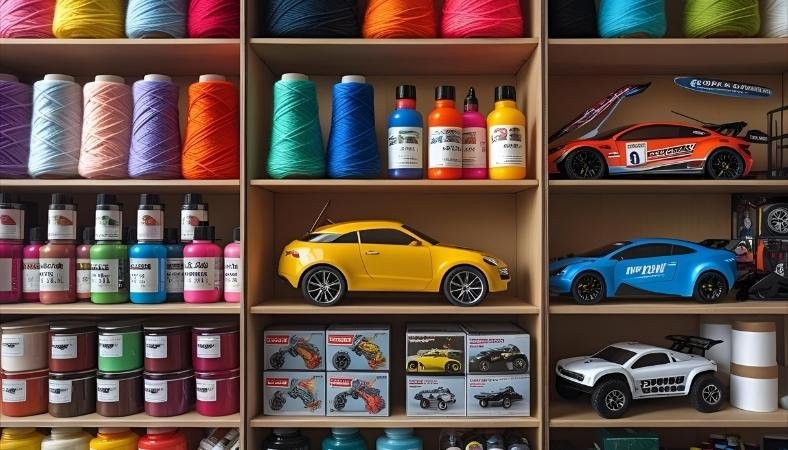Find hobby stores near you for crafts, RC cars, and models. Get tips on local shops, online options, 2025 trends, and fixes for stock issues or long drives.
Hobbies spark joy, whether you’re building a model rocket or knitting a cozy scarf. But finding the right hobby store nearby can feel like a treasure hunt, especially when you’re craving specific supplies or expert advice. If you’ve ever typed “hobby stores near me” into Google, you’re not alone millions are searching for local spots to fuel their passions. This guide will help you track down the best stores, explore online backups, and stay ahead with 2025’s hottest hobby trends. Let’s get started with some key pointers to make your search easier.
Key Takeaways
- Local stores like Hobby Lobby and Michaels offer hands-on browsing, while online sites like Tower Hobbies save the day when nothing’s nearby.
- The hobby market is booming at $366.6 billion globally in 2025, with STEM and eco-friendly kits leading the charge.
- Beat common headaches like out-of-stock items by using apps like Yelp or calling ahead.
- Compare chains for the best fit: Michaels shines for crafts, HobbyTown for RC cars.
- Start with free tools like Google Maps to find stores fast and save travel time.
What Are Hobby Stores?
 Hobby stores are your go-to spots for everything from paints to model trains. They’re packed with supplies for crafts, RC vehicles, games, and more, catering to beginners and pros alike. Picture walking into a store bursting with colorful yarn or shelves of tiny airplane kits—it’s a playground for creativity. The U.S. hobby market hit $64 billion in 2025, showing how much folks love these shops (IBISWorld).
Hobby stores are your go-to spots for everything from paints to model trains. They’re packed with supplies for crafts, RC vehicles, games, and more, catering to beginners and pros alike. Picture walking into a store bursting with colorful yarn or shelves of tiny airplane kits—it’s a playground for creativity. The U.S. hobby market hit $64 billion in 2025, showing how much folks love these shops (IBISWorld).
Types of Hobby Stores
Hobby stores come in all flavors. Big chains like Hobby Lobby focus on crafts, with 950+ locations stuffed with fabric and decor. Niche shops, like those for RC cars or Warhammer miniatures, dig deeper into specific hobbies. Then there’s the online world—sites like MegaHobby deliver model kits right to your door. Each type has its perks, depending on what you’re chasing.
Why Visit Them?
Nothing beats touching a product before you buy it. Local stores let you feel the weight of an RC car or test a paintbrush. Plus, staff often share tips you won’t find online. For example, a crafter in Ohio found eco-friendly yarn at JOANN, sparking a sustainable knitting project. Visiting also connects you to hobby communities, with 58 million U.S. campers in 2023 boosting outdoor gear shops (Glimpse).
How to Find Local Hobby Stores
Searching for “hobby stores near me” can pull up a map packed with options, but it’s not always simple. Maybe you’re after a rare Gundam model, or the closest store is a 40-minute drive. Here’s how to pin down the perfect spot without the hassle.
Using Maps and Apps
Start with Google Maps or Yelp. Type “rc hobby stores near me” or “craft stores nearby” and filter by ratings or distance. A quick tip: check store hours and call to confirm stock—saves you from empty shelves. Apps also show reviews, so you know if the staff’s helpful or the layout’s a maze. This tackles the accessibility issue many face, like Reddit users grumbling about long drives.
Top Chains Near You
Big names dominate the hobby scene. Hobby Lobby, with over 950 stores, is a craft haven, strong on home decor supplies. Michaels, with 1,200 locations, excels in art materials and custom framing. HobbyTown franchises are great for toys and RC gear. If you’re picking between Hobby Lobby and Michaels, go to Hobby Lobby for decor-heavy projects, but Michaels for painting or beadwork.
Regional Examples
Your area might have hidden gems. In the Midwest, Hub Hobby is a go-to for model trains and RC cars. If you’re in a smaller town, you might face a 30-40 minute drive, as X users often mention. If that’s you, try mapping multiple stores to find the closest one with the best reviews. This helps solve the “no stores nearby” frustration.
Niche Hobby Stores to Explore
Not all hobbies fit in one box. Whether you’re into remote-controlled drones or intricate model kits, niche stores cater to your specific vibe. Let’s break down the top categories.
RC and Model Shops
Love speed or precision? RC and model shops like HobbyTown or Tower Hobbies stock cars, planes, and trains. The rise of simulators in 2025, like golf or flight setups, is making these stores buzz (Glimpse). A pro tip: check online inventory before heading out, as Reddit users often complain about missing model kits like Gundam.
Crafts and DIY Outlets
For creative souls, craft stores are goldmines. JOANN and Michaels lead, with Walmart as a budget backup. The arts and crafts market hit $45.28 billion in 2024 and is expected to soar to $74.27 billion by 2033. A beginner in Texas used Michaels’ STEM kits to build a robot, proving these stores aren’t just for pros.
Game and Collectible Stores
If tabletop games or collectibles are your thing, check out Games Workshop for Warhammer or local card shops for Magic: The Gathering. Prices can sting—X users gripe about $200+ costs for rare items. Compare with Amazon for deals, but local shops often host game nights, adding community vibes.
Online Alternatives When Local Is Limited
 Sometimes, the nearest store is too far, or they don’t have what you need. Online options step in to save the day, blending variety with doorstep delivery.
Sometimes, the nearest store is too far, or they don’t have what you need. Online options step in to save the day, blending variety with doorstep delivery.
Best E-Commerce Sites
Sites like Tower Hobbies, MegaHobby, and Amazon shine for hobbyists. Tower Hobbies is a leader in RC gear, while MegaHobby nails model kits. Amazon’s massive selection is tough to beat, but smaller sites often have better niche stock. Compare: physical stores let you touch products, but online offers more variety and often free shipping.
Hybrid Shopping Tips
Many chains, like Hobby Lobby, offer in-store pickup for online orders, blending the best of both worlds. E-retail’s share of the hobby market is climbing to 28.8% by 2027 (Statista). If you’re in a pinch, order a model kit online when local stock’s low, like one X user did after finding no semi-gloss topcoat locally.
2025 Hobby Industry Trends
Hobbies aren’t static—they evolve with the times. In 2025, the industry’s buzzing with fresh ideas, from high-tech kits to eco-conscious supplies. Here’s what’s hot.
Rising STEM and Educational Hobbies
STEM hobbies, like model rockets or coding kits, are exploding. Canada’s hobby market is growing at 10.35% annually through 2029 (Statista). These kits teach kids (and adults!) science while having fun. For example, Estes Wholesale notes a surge in rocket-building workshops, perfect for curious minds.
Sustainability and DIY Focus
Green hobbies are in. Think reusable craft kits or eco-friendly paints. Stores are stocking sustainable supplies to meet demand, as the global market hits $366.6 billion in 2025 (Statista). Pick durable products to cut waste, like a knitter choosing recyclable yarn for a scarf.
Tech and Community Integration
Tech’s sneaking into hobbies with simulators and smart kits. Community events, like store-hosted paint nights, are also trending. These connect hobbyists, making stores more than just retail. Look for workshops at Michaels or game nights at local shops to dive in.
Tips for Smart Hobby Shopping
Shopping for hobby supplies can hit snags—empty shelves, high prices, or confusing store layouts. Here’s how to shop smarter and dodge those pain points.
Addressing Common Challenges
Stock shortages and high costs top the complaint list on Reddit and X. Try these fixes:
- Check reviews: Use Yelp to find stores with helpful staff or good stock.
- Budget smart: Search “DIY craft shops nearby” for deals on niche items.
- Avoid scalpers: Buy direct from stores or trusted sites like Tower Hobbies to skip inflated prices.
Beginner-Friendly Advice
New to hobbies? Start small with kits under $50, like a basic RC car or paint set. One newbie saved 15% at Michaels using a coupon for a starter craft kit. Ask staff for tips—they often know the best beginner products.
Comparisons for Value
Chains like Hobby Lobby offer variety, while indie shops give expert advice. Online stores beat local ones for rare items but lack the hands-on feel. Weigh your needs: if you want to browse, hit a chain; for specific models, go online.
Stats and Insights on Hobbies
Numbers tell a story about hobbies’ popularity. Let’s unpack some key stats to show why these stores matter.
Market Growth Data
The U.S. hobby market is worth $64 billion in 2025, growing at 4.6% yearly (IBISWorld). Globally, it’s a massive $366.6 billion (Statista). This growth fuels more stores and online options, giving you plenty of choices.
Popular Hobbies Today
Cooking and gaming top the charts, per a 2024 Statista survey. Outdoor hobbies are huge too—58 million U.S. households camped in 2023 (Glimpse). Stores like HobbyTown stock gear for these trends, from grills to game dice.
Expert Tips from Pros
Retailers like Estes suggest hosting events to draw crowds. Look for stores offering workshops or demos—they’re great for learning. One pro tip: ask staff about restock schedules to snag hot items.
Frequently Asked Questions
How do I find hobby stores near me?
Search “rc hobby stores near me” on Google Maps or Yelp. Filter by ratings, check hours, and call to confirm stock. This saves time and ensures you find a store with what you need.
What are the best hobby store chains?
Hobby Lobby (crafts, 950+ stores), Michaels (art supplies, 1,200+ locations), and HobbyTown (RC/toys) lead. Use their websites to locate stores and check product availability.
Are there online alternatives to local hobby stores?
Yes, Tower Hobbies, MegaHobby, and Amazon offer vast selections with fast shipping. They’re perfect when local stores are far or lack niche items like model kits.
What hobbies are trending in 2025?
STEM kits, sustainable crafts, and tech-driven hobbies like simulators are hot. The market’s growing at 4.6% annually, with eco-friendly supplies gaining popularity.
How to deal with stock shortages at hobby stores?
Call ahead or check online inventory. If items are unavailable, try Walmart for basics or order from online specialists like Tower Hobbies for niche products.
What do hobby stores typically sell?
They stock crafts, RC vehicles, model kits, games, and collectibles. Chains focus on variety, while niche shops offer specialized items like Warhammer or train sets.
Final Takeaway
Your next hobby adventure starts with the right store. Whether you’re browsing Michaels for paints or ordering an RC car from Tower Hobbies, use these tips to shop smart. Search “hobby stores near me” today, explore 2025’s trends, and spark your creativity!




